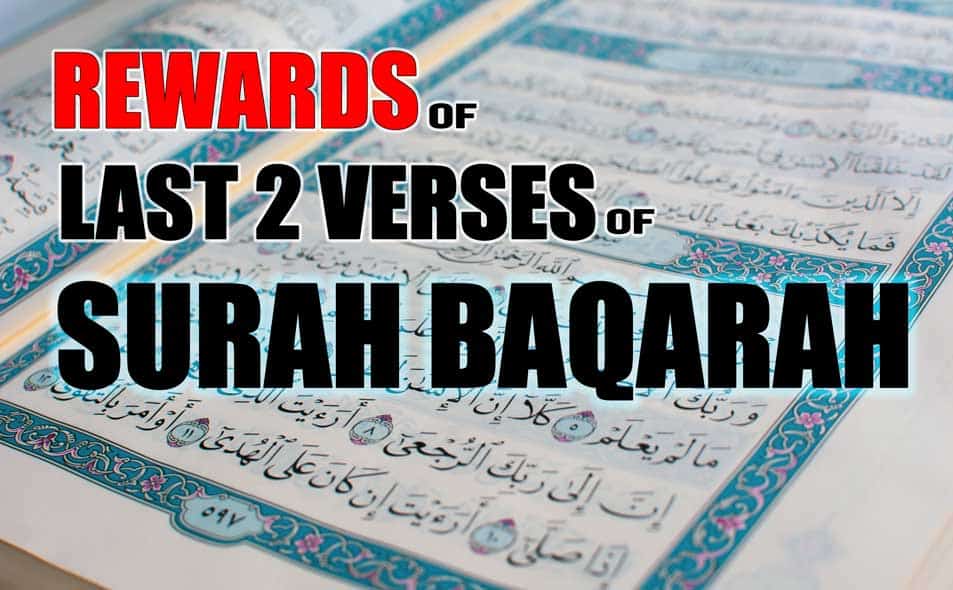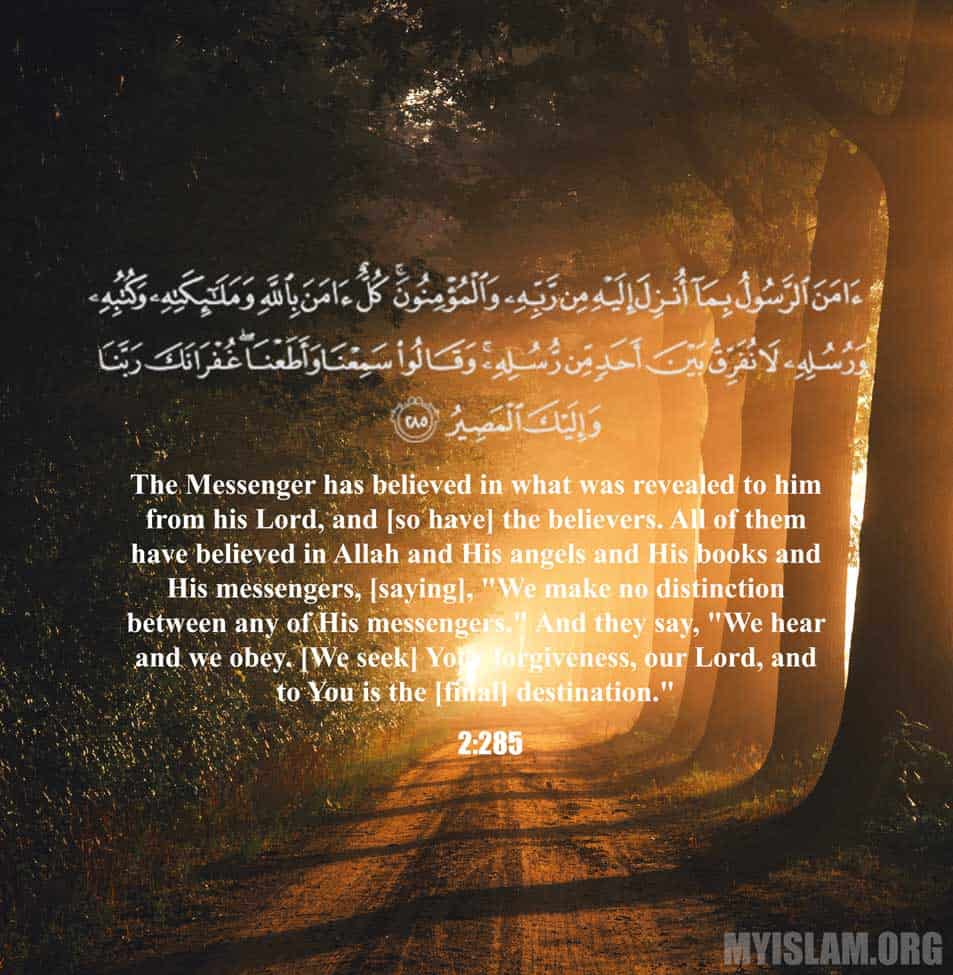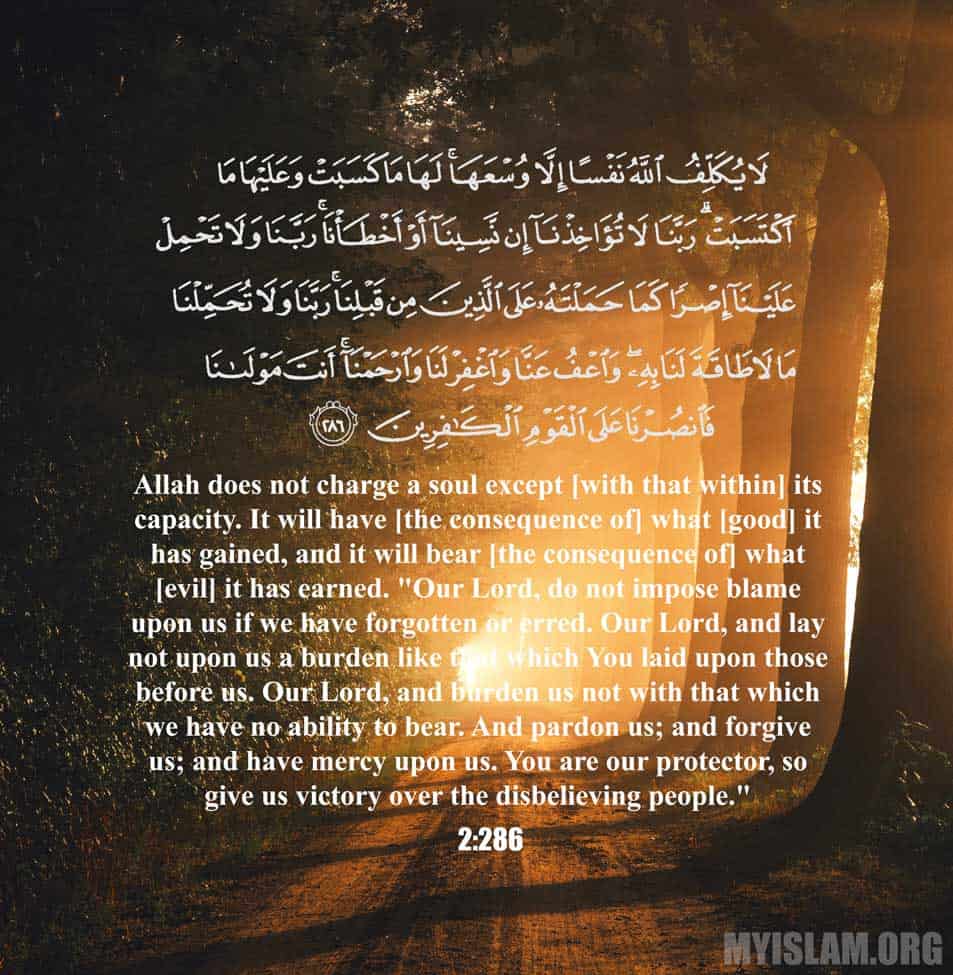
Anyone who knew the benefits wouldn’t go to sleep before having recited these two verses.
For this reason, we should make a special effort to memorize these verses by heart, and to share this knowledge with friends and family members.
It was narrated that ‘Abdullah said:
“When the Messenger of Allah (ﷺ) was taken on the Night Journey (Lailat al Miraj), he came to Sidrah Al-Muntaha, which is in the sixth heaven. That is where everything that comes up from below ends, and where everything that comes down from above, until it is taken from it. Allah says: When what covered the lote-tree did cover it! [1] He said: “It was moths of gold. And I was given three things: The five daily prayers, the last verses of Surah Al-Baqarah, and whoever of my Ummah dies without associating anything with Allah will be forgiven for Al-Muqhimat.” The sins of the worst magnitude that drag one into the Fire.” (An-Nihayah)
This is from Sunan an-Nasa’i hadith 451 and classified as Sahih by Darussalam.
Abd al-Rahman b. Yazid said:
I asked Abu Mas’ud while he was making circumambulation of the Ka’bah (about the recitation of some verses from the Qur’an). He said: The Messenger of Allah (ﷺ) said: If anyone recited two verses from the last of Surah al-Baqarah at night, they will be sufficient for him.
From Sunan Abi Dawud hadith 1397 graded as Sahih by Al-Albani.
Alhamdulillah!
Within just 4 years, we released 3 versions of our online Qur'an. (can read about the journey under the about us tab) Our goal was to try and create the best online learning experience, especially for those who struggle to read the Qur'an.
Alhamdulillah, it has been well received, with over 21,584,301 online readers and an accumulated 1,442,550 hours spent reading the Qur'an.
With your support today, we can continue to make massive strides in our Qur'an technology with version 4, and Insha-Allah, 2023 will be the year we release both an Ad-free Android and IOS Qur'an and Prayer Times app.
Please help us make this possible.
Hadith – Quran Will Intercede on Day of Judgement
Abu Umama said he heard Allah’s Messenger (ﷺ) say:
Recite the Qur’an, for on the Day of Resurrection it will come as an intercessor for those who recite It. Recite the two bright ones, al-Baqara and Surah Al ‘Imran, for on the Day of Resurrection they will come as two clouds or two shades, or two flocks of birds in ranks, pleading for those who recite them. Recite Surah al-Baqara, for to take recourse to it is a blessing and to give it up is a cause of grief, and the magicians cannot confront it. (Mu’awiya said: It has been conveyed to me that here Batala means magicians.)
Reference: Sahih Muslim 804 a
In-book reference: Book 6, Hadith 302
He says, two clouds or flocks of birds symbolically so we can visualize and see just how large the the rewards will be on the day of judgement.
Surah Baqarah has been praised almost like no other chapter in the Qur’an.There are many hadiths which mention the virtues of Surah Baqarah (e.g. the benefits of Ayatul Kursi verse 255) for those who read it but we have to constrain this topic to just the last two verses otherwise this article would be too long.
Here’s the last two ayat of Surah Baqarah repeated.
Surah Baqarah Verse 285

In Arabic:
ءَامَنَ ٱلرَّسُولُ بِمَآ أُنزِلَ إِلَيْهِ مِن رَّبِّهِۦ وَٱلْمُؤْمِنُونَ ۚ كُلٌّ ءَامَنَ بِٱللَّهِ وَمَلَٰٓئِكَتِهِۦ وَكُتُبِهِۦ وَرُسُلِهِۦ لَا نُفَرِّقُ بَيْنَ أَحَدٍ مِّن رُّسُلِهِۦ ۚ وَقَالُوا۟ سَمِعْنَا وَأَطَعْنَا ۖ غُفْرَانَكَ رَبَّنَا وَإِلَيْكَ ٱلْمَصِيرُ
Transliteration: Aamanar-Rasoolu bimaaa unzila ilaihi mir-Rabbihee walmu’minoon; kullun aamana billaahi wa Malaaa’ikathihee wa Kutubhihee wa Rusulihee laa nufarriqu baina ahadim-mir-Rusulih wa qaaloo sami’naa wa ata’naa ghufraanaka Rabbanaa wa ilaikal-maseer
Translation: The Messenger has believed in what was revealed to him from his Lord, and [so have] the believers. All of them have believed in Allah and His angels and His books and His messengers, [saying], “We make no distinction between any of His messengers.” And they say, “We hear and we obey. [We seek] Your forgiveness, our Lord, and to You is the [final] destination.”
Commentary: It was mentioned that the people of the two books before said “we hear and we disobey” (4:46) however the Muslims through this ayah say “we hear and we obey”. Their tongues are humbled because they know forgivness can only be received by Asking Allah and so they say him, “we seek your forgiveness, you are our journey’s end”.
Allah confirms them when they said, “We hear and obey”. He praises them in this ayat and removes from them the hardship they experience and thoughts which troubles them.
This is the blessing for those who show true commitment and submission to Allah. The children of Israel had to endure hardships since they said “we hear and we disobey”.
“Cursed were those who disbelieved among the Children of Israel by the tongue of David and of Jesus, the son of Mary. That was because they disobeyed and [habitually] transgressed.”
Quran 5:78
Such is the result of disobedience and defiance towards Allah.
Surah Baqarah Ayah 286

Last Ayat of Surah Baqarah (2:286) in Arabic:
لَا يُكَلِّفُ ٱللَّهُ نَفْسًا إِلَّا وُسْعَهَا ۚ لَهَا مَا كَسَبَتْ وَعَلَيْهَا مَا ٱكْتَسَبَتْ ۗ رَبَّنَا لَا تُؤَاخِذْنَآ إِن نَّسِينَآ أَوْ أَخْطَأْنَا ۚ رَبَّنَا وَلَا تَحْمِلْ عَلَيْنَآ إِصْرًا كَمَا حَمَلْتَهُۥ عَلَى ٱلَّذِينَ مِن قَبْلِنَا ۚ رَبَّنَا وَلَا تُحَمِّلْنَا مَا لَا طَاقَةَ لَنَا بِهِۦ ۖ وَٱعْفُ عَنَّا وَٱغْفِرْ لَنَا وَٱرْحَمْنَآ ۚ أَنتَ مَوْلَىٰنَا فَٱنصُرْنَا عَلَى ٱلْقَوْمِ ٱلْكَٰفِرِينَ
Transliteration: Laa yukalliful-laahu nafsan illaa wus’ahaa; lahaa maa kasabat wa ‘alaihaa maktasabat; Rabbanaa laa tu’aakhiznaaa in naseenaaa aw akhtaanaa; Rabbanaa wa laa tahmil-‘alainaaa isran kamaa hamaltahoo ‘alal-lazeena min qablinaa; Rabbanaa wa laa tuhammilnaa maa laa taaqata lanaa bih; wa’fu ‘annaa waghfir lanaa warhamnaa; Anta mawlaanaa fansurnaa ‘alal qawmil kaafireen (section 40)
Translation: Allah does not charge a soul except [with that within] its capacity. It will have [the consequence of] what [good] it has gained, and it will bear [the consequence of] what [evil] it has earned. “Our Lord, do not impose blame upon us if we have forgotten or erred. Our Lord, and lay not upon us a burden like that which You laid upon those before us. Our Lord, and burden us not with that which we have no ability to bear. And pardon us; and forgive us; and have mercy upon us. You are our protector, so give us victory over the disbelieving people.”
Commentary: Allah says, he does not burden any person more than what is in their capacity. Any trial we go through life are custom-tailored by our Lord to match our ability to manage them. There isn’t anything we can’t overcome.
My hardships are designed for me, your difficulties in life are yours. When we try to compare ourselves to others we should remember this.
Before ignorance was bliss, what we did not see, we did not know. Now, with social media it’s easy to see the highlight reels of everyone life and see how they are doing.
But we must be careful and guard your minds, this can be toxic if left to our unconscious mind, we can easily become jealous or envious but we must remember we do not know the full story. We don’t know the trauma, all the difficulties, work they may have endured. The same can be said for those who grow envious of us, they don’t know how we struggled so it’s really a baseless comparison.
In this verse of Surah Baqarah we should note, the commandments of Allah were put on everyone, if a persons says he or she can’t read the Quran daily or can’t read all five prayers this is not true. He did not ‘burden a soul more than it could bear’ so if someone says those things, they may sincerely believe it, but the truth is they just haven’t made it a priority in their life.
The second part of this verse, “It will have [the consequence of] what [good] it has gained, and it will bear [the consequence of] what [evil] it has earned.” In this life and the hereafter, nothing will be free. We must be deserving of the things we want to get and then go out and earn it.
We will be rewarded for the service we rendered. We have to watch for ourselves, we will not reap the benefit from what our friends do, our brother or sister does. We will only be rewarded in proportion to the things that we have done.
The same applies in regards to punishment.
For every last one of our good deeds and our bad deeds we will be held accountable on the day of judgement.
For those who have read this far, jazakallah. I have one question you can take with you before we part ways.
What habits do you have which you can stop that is bad or not productive?
This can includes habits of omission, meaning things you know you should do but don’t. What is one habit that doesn’t require much effort but would serve us well should we implement it into our life?
We should constantly be monitoring our actions and what we do on a day to day basis. Sometimes life goes by so quick and we don’t even make time for a self assessment to see how we are doing.
This is the beauty of the last two verses of Surah Baqarah it makes you think and reflect which is why we should refer to them daily. It’s a constant reminder and perhaps a habit worth acquiring.




Asalamu alaikum, i discovered this website yesterday and I make sure I come to this exact page for my nightly recitation fo the last two verses of suratul Baqarah. may Allah SWT reward you for this . can’t wait to explore the rest of this website.
Like wise. JazaakAllah khairun kaseerah to the owner of this website. May Allah reward you immensely Aameen
Alhamdulillah.. Got alot to know about our beautiful Islam.. Masha Allah and BarakAllah for every effort you have invested in building this beautiful content. Looking forward to learn more, Inshaa Allah .
Jazaakallahu Khairan kaseeran kaseera fid duniya wal akhirah. Ameen
Mashallah
Mashallah
Masha Allah …..
MashaAllah
Helpful article.
Alhamdulilah, Allah guided me to find this website. now I will never sleep without reciting these 2 ayat, Inshallah.
JazakAllah
Very helpful site
This make my faith stronger and I am very happy I have found this website at the right time of my life ????
Keep up doing like this. May Allah SWT reward you guys immensely. Wonderfully explained!!
Alhamdullilah
Alhumdulillah the reminders benefits the believers.